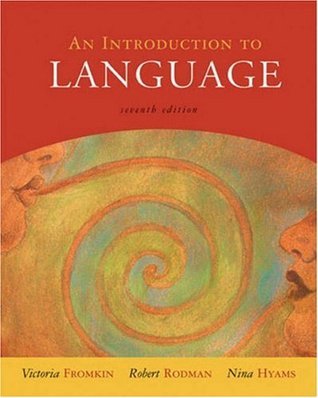What do you think?
Rate this book


620 pages, Paperback
First published January 1, 1974
In 1762 Bishop Robert Lowth wrote A Short Introduction to English Grammar with Critical Notes. Lowth prescribed a number of new rules for English, many of them influenced by his personal taste. Before the publication of his grammar, practically everyone—upper-class, middle-class, and lower-class—said I don’t have none. and You was wrong about that. Lowth, however, decided that “two negatives make a positive” and therefore one should say I don’t have any; and that even when you is singular it should be followed by the plural were. Many of these prescriptive rules were based on Latin grammar and made little sense for English. Because Lowth was influential and because the rising new class wanted to speak “properly,” many of these new rules were legislated into English grammar, at least for the prestige dialect — that variety of the language spoken by people in positions of power.

Birds cannot tell us their story, however beautifully they sing. Human language is different of course. Our words and sentences are not simply responses to internal and external stimuli. If you’re tired you may yawn, but you may also say “I’m tired,” or “I’m going to bed,” or “I’m going to Starbucks for a double espresso.” Notably, you also have the right to remain silent, or talk about things completely unrelated to your physical state—the weather, the movie you saw last night, your plans for the weekend, or most interesting of all, your linguistics class. The linguists call this property of human language displacement: the capacity to talk (or sign) messages that are unrelated to here and now.

Language itself is not sexist or racist, but people can be, and because of this particular words take on negative meanings. In his book The Language Instinct, the psychologist Steven Pinker uses the expression euphemism treadmill to describe how the euphemistic terms that are created to replace negative words often take on the negative associations of the words they were coined to replace. For example, handicapped was once a euphemism for the offensive term crippled, and when handicapped became politically incorrect it was replaced by the euphemism disabled. And as we write, disabled is falling into disrepute and is often replaced by yet another euphemism, challenged. Nonetheless, in all such cases, changing language has not resulted in a new worldview for the speakers.

Some word creation comes from deliberately miscast back-formations. The word bikini comes from the Bikini atoll of the Marshall Islands. Because the first syllable bi- is a morpheme meaning ‘two’ in words like bicycle, some clever person called a topless bathing suit a monokini and a tank top with a bikini bottom a tankini. Historically, a number of new words have entered the English lexicon in a similar way, some of the most recent being the appletini, chocotini, mintini and God-knows-what-else-tini to be found as flavor additives to the traditional martini libation.

In 1888 members of the International Phonetic Association developed a phonetic alphabet to symbolize the sounds of all languages. They utilized both ordinary letters and invented symbols. Each character of the alphabet had exactly one value across all of the world’s languages. Someone who knew this alphabet would know how to pronounce a word written in it, and upon hearing a word pronounced, would know how to write it using the alphabetic symbols. The inventors of this International Phonetic Alphabet, or IPA, knew that a phonetic alphabet should include just enough symbols to represent the fundamental sounds of all languages.